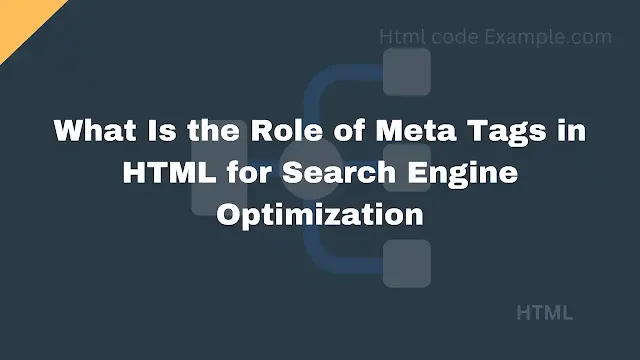Ever wondered how Google knows what your webpage is about? You've spent time writing great content, adding cool images, and hitting "publish"... but no one seems to find your site. What's missing?
Let me introduce you to a behind the scenes hero: meta tags.
What Exactly Are Meta Tags?
Think of meta tags as little notes you leave for search engines. You can't see them on the actual page, but they live in the HTML code and give search engines like Google a quick summary of what your page is all about.
Imagine you're sending a letter. Meta tags are like the label on the envelope they help the post office (or in this case, Google) figure out where it should go and what it's about before even opening it.
Why Should You Care About Meta Tags?
Because they help your content get noticed.
Here's the truth: search engines don't read web pages like humans do. They rely on clues. Meta tags are some of the strongest clues you can give. When done right, they can improve your visibility, increase your clickthrough rates, and boost your rankings.
Let's break down the main types of meta tags and how they help:
Meta Title (Title Tag)
This is the title that appears in search results. It tells both search engines and users what the page is about.
Example:
<title>How to Bake the Perfect Chocolate Cake</title>
If someone searches for "how to bake chocolate cake," a clear, catchy title like that grabs attention and gets clicks.
Meta Description
This short summary shows up below the title in search results. While it doesn't directly impact rankings, a wellwritten description can convince people to click.
Example:
<meta name="description" content="Learn the secrets to baking a soft, rich chocolate cake at home with simple ingredients and easy steps.">
It's your chance to sell the content. Think of it like the blurb on the back of a book.
Meta Robots Tag
This one tells search engines what to do with your page whether they should index it or not, or follow the links on it.
Example:
<meta name="robots" content="index, follow">
Meta Charset Tag
Okay, this one's more technical. It sets the character encoding (how letters and symbols are stored). It doesn't affect SEO directly, but it keeps your content readable.
Example:
<meta charset="UTF8">Real Talk: Do Meta Tags Guarantee Top Rankings?
Nope. Think of meta tags like a resume. They help you present your content in the best light, but the content itself still needs to shine.
If your page is slow, hard to read, or full of outdated info, no meta tag in the world can save it. But if you've got helpful content and you use meta tags wisely? You're giving yourself a great head start.
Final Thoughts: Use Meta Tags Like a Friendly Introduction
When someone visits your page or when Google scans it meta tags are like a handshake. A good one sets the tone. A bad one (or none at all) can leave a confused first impression.
So why not take a few minutes to write meta tags that work as hard as your content does? They're small details with big potential.
